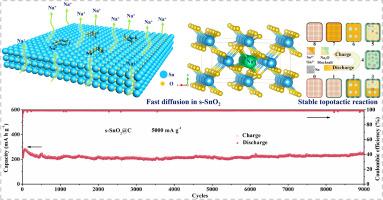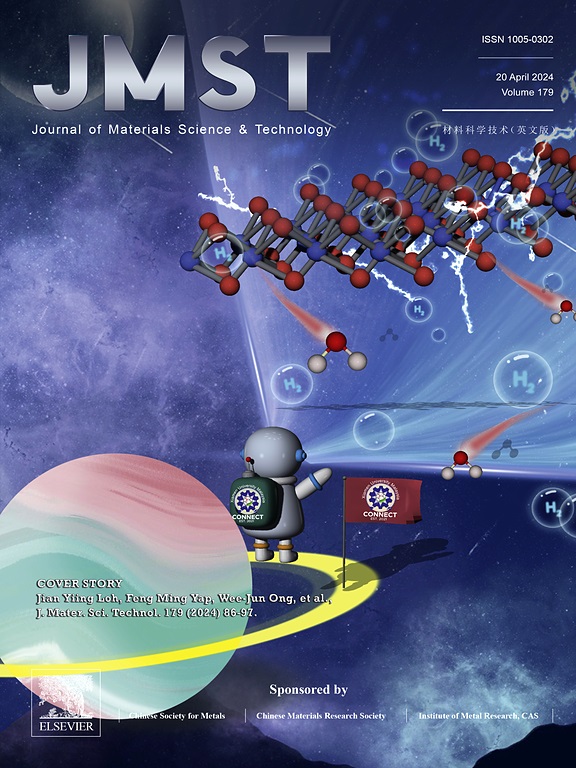Fast diffusion and stable topotactic reaction in single crystal conversion anode
IF 11.2
1区 材料科学
Q1 MATERIALS SCIENCE, MULTIDISCIPLINARY
引用次数: 0
Abstract
Conversion electrodes typically have high theoretical specific capacity, but mostly suffer large structural changes during charge/discharge and result in poor cycling stability. The optimization of the polycrystalline materials is the mostly used strategy, however, these polycrystalline materials are intrinsically vulnerable to grain-boundary (intergranular) fracture caused by the anisotropic volume change during sodiation/desodiation, resulting in rapid impedance growth and capacity decay. Herein, we propose an alternative pathway to design single-crystal materials as potential conversion anodes. As an example, SnO2 with different crystallinities is successfully synthesized via solvothermal methods and compared to determine the implications of different crystallinity for the electrochemical properties of conversion anodes. It is demonstrated that the single-crystal SnO2 not only has faster Na+ diffusion dynamics but also maintains structural stability via topotactic reaction. Further optimization of the electron conduction and structural robustness is realized by uniformly covering a graphitic carbon shell on the surface of single-crystal SnO2 nanosheets. The modified single-crystal SnO2 exhibits a high reversible capacity of 436.2 mA h g–1 and maintains a high capacity of 257.1 mA h g-1 and remarkable capacity retention of about 98.9% after 9000 cycles at 5000 mA g-1. The deep understandings of the topotactic reaction in single crystal conversion anode in this work provide a theoretical foundation and new direction for further developing electrode materials with excellent electrochemical performance, especially high rate capabilities, and long cyclability.

单晶转换阳极中的快速扩散和稳定拓扑反应
转换电极通常具有较高的理论比容量,但在充放电过程中大多会发生较大的结构变化,导致循环稳定性较差。多晶材料的优化是最常用的策略,然而,这些多晶材料在钠化/解钠过程中由于各向异性的体积变化而导致晶界(晶粒间)断裂,从而导致阻抗快速增长和容量衰减。在此,我们提出了设计单晶材料作为潜在转换阳极的另一种途径。例如,我们通过溶热法成功合成了不同结晶度的二氧化锡,并对其进行了比较,以确定不同结晶度对转换阳极电化学特性的影响。结果表明,单晶 SnO2 不仅具有更快的 Na+ 扩散动力学,还能通过拓扑反应保持结构的稳定性。通过在单晶二氧化锡纳米片表面均匀地覆盖一层石墨碳壳,进一步优化了电子传导和结构的稳健性。改性后的单晶二氧化锡显示出 436.2 mA h g-1 的高可逆容量,并在 5000 mA g-1 下循环 9000 次后保持 257.1 mA h g-1 的高容量和约 98.9% 的显著容量保持率。这项工作对单晶转换阳极中拓扑反应的深入理解为进一步开发具有优异电化学性能,尤其是高倍率能力和长循环能力的电极材料提供了理论基础和新的方向。
本文章由计算机程序翻译,如有差异,请以英文原文为准。
求助全文
约1分钟内获得全文
求助全文
来源期刊

Journal of Materials Science & Technology
工程技术-材料科学:综合
CiteScore
20.00
自引率
11.00%
发文量
995
审稿时长
13 days
期刊介绍:
Journal of Materials Science & Technology strives to promote global collaboration in the field of materials science and technology. It primarily publishes original research papers, invited review articles, letters, research notes, and summaries of scientific achievements. The journal covers a wide range of materials science and technology topics, including metallic materials, inorganic nonmetallic materials, and composite materials.
 求助内容:
求助内容: 应助结果提醒方式:
应助结果提醒方式:


